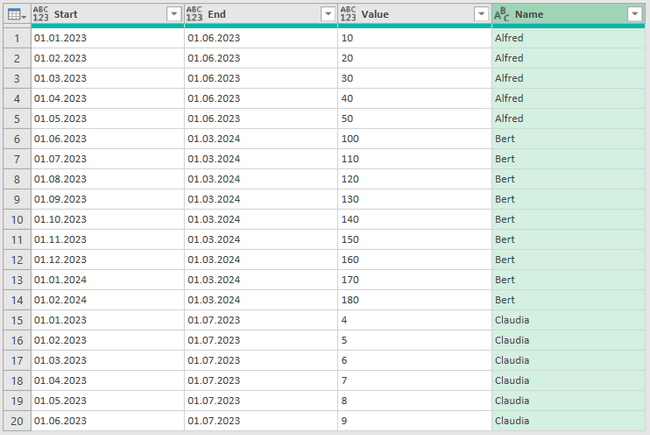FabCon is coming to Atlanta
Join us at FabCon Atlanta from March 16 - 20, 2026, for the ultimate Fabric, Power BI, AI and SQL community-led event. Save $200 with code FABCOMM.
Register now!Go To
- Power BI forums
- Get Help with Power BI
- Desktop
- Service
- Report Server
- Power Query
- Mobile Apps
- Developer
- DAX Commands and Tips
- Custom Visuals Development Discussion
- Health and Life Sciences
- Power BI Spanish forums
- Translated Spanish Desktop
- Training and Consulting
- Instructor Led Training
- Dashboard in a Day for Women, by Women
- Galleries
- Data Stories Gallery
- Themes Gallery
- Contests Gallery
- QuickViz Gallery
- Quick Measures Gallery
- Visual Calculations Gallery
- Notebook Gallery
- Translytical Task Flow Gallery
- TMDL Gallery
- R Script Showcase
- Webinars and Video Gallery
- Ideas
- Custom Visuals Ideas (read-only)
- Issues
- Issues
- Events
- Upcoming Events
Turn on suggestions
Auto-suggest helps you quickly narrow down your search results by suggesting possible matches as you type.
Showing results for
The Power BI Data Visualization World Championships is back! It's time to submit your entry. Live now!
- Power BI forums
- Forums
- Get Help with Power BI
- Power Query
- Generalizing a table with column reduction
Reply
Topic Options
- Subscribe to RSS Feed
- Mark Topic as New
- Mark Topic as Read
- Float this Topic for Current User
- Bookmark
- Subscribe
- Printer Friendly Page
- Mark as New
- Bookmark
- Subscribe
- Mute
- Subscribe to RSS Feed
- Permalink
- Report Inappropriate Content
Generalizing a table with column reduction
01-18-2024
12:55 AM
Dear community,
actually i want to solve an easy task but i am struggling and hope that someone can help me.
I have the following table:
| Alfred | Alfred_1 | Alfred_2 | Bert | Bert_1 | Bert_2 | Claudia | Claudia_1 | Claudia_2 |
| 01.01.2023 | 01.06.2023 | 10 | 01.06.2023 | 01.03.2024 | 100 | 01.01.2023 | 01.07.2023 | 4 |
| 01.02.2023 | 01.06.2023 | 20 | 01.07.2023 | 01.03.2024 | 110 | 01.02.2023 | 01.07.2023 | 5 |
| 01.03.2023 | 01.06.2023 | 30 | 01.08.2023 | 01.03.2024 | 120 | 01.03.2023 | 01.07.2023 | 6 |
| 01.04.2023 | 01.06.2023 | 40 | 01.09.2023 | 01.03.2024 | 130 | 01.04.2023 | 01.07.2023 | 7 |
| 01.05.2023 | 01.06.2023 | 50 | 01.10.2023 | 01.03.2024 | 140 | 01.05.2023 | 01.07.2023 | 8 |
| 01.11.2023 | 01.03.2024 | 150 | 01.06.2023 | 01.07.2023 | 9 | |||
| 01.12.2023 | 01.03.2024 | 160 | ||||||
| 01.01.2024 | 01.03.2024 | 170 | ||||||
| 01.02.2024 | 01.03.2024 | 180 |
and i want to transform the table to the following:
| Start | End | Value | Name |
| 01.01.2023 | 01.06.2023 | 10 | Alfred |
| 01.02.2023 | 01.06.2023 | 20 | Alfred |
| 01.03.2023 | 01.06.2023 | 30 | Alfred |
| 01.04.2023 | 01.06.2023 | 40 | Alfred |
| 01.05.2023 | 01.06.2023 | 50 | Alfred |
| 01.06.2023 | 01.03.2024 | 100 | Bert |
| 01.07.2023 | 01.03.2024 | 110 | Bert |
| 01.08.2023 | 01.03.2024 | 120 | Bert |
| 01.09.2023 | 01.03.2024 | 130 | Bert |
| .. | .. | .. | .. |
I would be happy to receive all solutions
Greetings jb257
Solved! Go to Solution.
1 ACCEPTED SOLUTION
- Mark as New
- Bookmark
- Subscribe
- Mute
- Subscribe to RSS Feed
- Permalink
- Report Inappropriate Content
01-18-2024
02:17 AM
Hi,
let
Source = Your_Source,
Name = List.Alternate(Table.ColumnNames(Source),2,1,1),
Data = List.Transform(List.Split(Table.ToColumns(Source),3), each Table.FromColumns(_, {"Start", "End", "Value"})),
#"Data+Name" = Table.FromColumns({Data}&{Name}, {"Data", "Name"}),
Expand = Table.ExpandTableColumn(#"Data+Name", "Data", {"Start", "End", "Value"}, {"Start", "End", "Value"}),
NotNull = Table.SelectRows(Expand, each [Start] <> null)
in
NotNull
Stéphane
3 REPLIES 3
- Mark as New
- Bookmark
- Subscribe
- Mute
- Subscribe to RSS Feed
- Permalink
- Report Inappropriate Content
01-18-2024
04:22 AM
You can also use this version. Just change 2nd step YourSource = Source to your data
let
Source = Table.FromRows(Json.Document(Binary.Decompress(Binary.FromText("hdJdDoQgDATgqxiezab0B/AsxvtfYwVto+wkm0jigPP1QfY9Uf6cDxNLWkcoHjLNOz1IDzqO/fxVrx40HevFM+SZ5sabj/EMeQteIC9eb5iP8QL5ErxCXr2+YT7GK+Rr8AZ5u+uZMB/jDfJt8Mv55qtbGVsG/3NYG7QYW4Ue3y2oed0W/WnW/03GzTY1jy8=", BinaryEncoding.Base64), Compression.Deflate)), let _t = ((type nullable text) meta [Serialized.Text = true]) in type table [Alfred = _t, Alfred_1 = _t, Alfred_2 = _t, Bert = _t, Bert_1 = _t, Bert_2 = _t, Claudia = _t, Claudia_1 = _t, Claudia_2 = _t]),
YourSource = Source,
#"Added Index" = Table.AddIndexColumn(YourSource, "Index", 0, 1, Int64.Type),
#"Unpivoted Other Columns" = Table.UnpivotOtherColumns(#"Added Index", {"Index"}, "Attribute", "Value"),
Ad_Name = Table.AddColumn(#"Unpivoted Other Columns", "Name", each Text.BeforeDelimiter([Attribute], "_"), type text),
#"Grouped Rows" = Table.Group(Ad_Name, {"Name"}, {{"All", each _, type table [Index=number, Attribute=text, Value=text, Name=text]}, {"Start", each Table.SelectRows(_, (r)=> r[Attribute] = r[Name])[Value], type list}, {"End", each Table.SelectRows(_, (r)=> r[Attribute] = r[Name] & "_1")[Value], type list}, {"Value", each Table.SelectRows(_, (r)=> r[Attribute] = r[Name] & "_2")[Value], type list}}),
Ad_MergedListsToTable = Table.AddColumn(#"Grouped Rows", "MergedListsToTable", each Table.SelectRows(Table.FromColumns({[Start], [End], [Value]}, {"Start", "End", "Value"}), (r)=> Text.Trim(r[Start]) <> null and Text.Trim(r[Start]) <> ""), type table),
#"Removed Other Columns" = Table.SelectColumns(Ad_MergedListsToTable,{"MergedListsToTable", "Name"}),
#"Expanded MergedTables" = Table.ExpandTableColumn(#"Removed Other Columns", "MergedListsToTable", {"Start", "End", "Value"}, {"Start", "End", "Value"})
in
#"Expanded MergedTables"
- Mark as New
- Bookmark
- Subscribe
- Mute
- Subscribe to RSS Feed
- Permalink
- Report Inappropriate Content
01-18-2024
02:17 AM
Hi,
let
Source = Your_Source,
Name = List.Alternate(Table.ColumnNames(Source),2,1,1),
Data = List.Transform(List.Split(Table.ToColumns(Source),3), each Table.FromColumns(_, {"Start", "End", "Value"})),
#"Data+Name" = Table.FromColumns({Data}&{Name}, {"Data", "Name"}),
Expand = Table.ExpandTableColumn(#"Data+Name", "Data", {"Start", "End", "Value"}, {"Start", "End", "Value"}),
NotNull = Table.SelectRows(Expand, each [Start] <> null)
in
NotNull
Stéphane
- Mark as New
- Bookmark
- Subscribe
- Mute
- Subscribe to RSS Feed
- Permalink
- Report Inappropriate Content
01-18-2024
05:41 AM
Awesome, thank you very much!
Helpful resources
Top Kudoed Authors
| User | Count |
|---|---|
| 19 | |
| 13 | |
| 9 | |
| 8 | |
| 7 |


